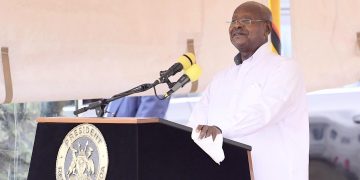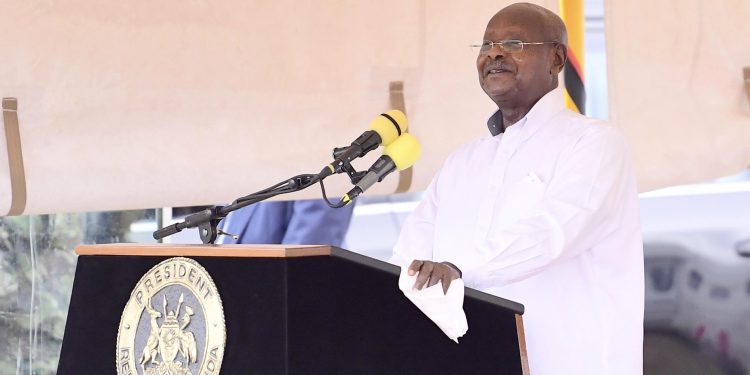President Yoweri Kaguta Museveni has attributed the failure to solve the the issue of security within the Great Lakes Region to mixing up three issues; armed conflicts for just causes, armed conflicts for reactionary aims and the use of terrorist methods.
He said the tendency, which is not correct, is to bunch up all conflicting parties as “negative forces”.
He said Uganda is a good laboratory for all manner of conflicts.
“We have the just wars like the ones waged between 1971 and 1986 by the different fighting groups against the regimes of Amin, Obote II and Okello,” he pointed out Tuesday while delivering the State of the Nation Address at Kololo ceremonial grounds.
Museveni said the war was just because the fight was about the freedom to vote by secret ballot for all adults above the age of 18 at regular intervals; the struggle against extra – judicial killings; the struggle against sectarianism that was enforced by arms; etc.
“The last elections were in April 1962 and we never had any other elections until the 10th of December 1980 and even those were contested from the beginning of the process to the end. We tried to talk to the groups that thought that they had the upper hand to no avail and worse still, they would kill anybody with a different opinion (Kiwanuka, Bataringaya, Latim, Oryema, Kasura, Sebugwawo, Luttamaguzi, Nkangirwa, We, therefore, had no alternative but to fight. That is why between 1966 and 1986, Uganda was among the top four refugees–generating countries in the world at that time,” he said.
Museveni gave an example of the struggle by the SPLM of Sudan against the Arab-Islamic chauvinist regime of Khartoum which was insisting that the very dark Dinkas, Shilluks, Nuers etc. of South Sudan were Arabs and had to live under sharia law.
“How do you resolve that madness? How about the Whites in South Africa who said that the indigenous Africans could not have voting rights in the country of their ancestry? The answer was a just war in each of the above situations,” Museveni questioned.
On the unjust wars, Museveni said these are either aggression or of a reactionary nature – non – progressive.
“Take the colonial wars of conquest. Why were the colonialists conquering other countries? What rights did they have to do so? Then you come to ADF, Kony, Lakwena, etc. ADF said that they wanted to make Uganda Islamic by force. Kony wanted to rule us by some commandments that were to be given by the Holy Spirit. Lakwena wanted “Government megwa” (our Government), by which she meant the Acholi tribal Government over the whole of Uganda. These were aims, all right; but they were wrong aims, oppressive aims, negative, unprogressive aims. They were, therefore, reactionary (kupinga maendeleo) aims and, hence, the wars fought in their implementation were unjust wars, just like the wars of colonial conquest,” he explained.
Having talked about just and unjust wars, he also clarified on the issue of terrorism, saying it is wrong to say that every armed group is a terrorist group whether they are fighting a just or unjust war.
He gave an example of Alice Lakwena whom he said was fighting an unjust war of Acholi sectarianism.
“She was definitely not a terrorist because she was not using terrorist methods. Terrorist methods mean using violence indiscriminately such as attacking non-combatants, killing prisoners of war or torturing them. Lakwena was confused, using the witchcraft of smearing her fighters with the Oil of Moya tree (Shea butter tree) and telling them that they were immune to bullets but she was not a terrorist because she was not targeting non-combatants, she was not killing prisoners of war (that is how Major Byensi survived) etc. Kony and ADF were, on the other hand, fighting both an unjust war but also a terrorist one,” Museveni said.
He explained that this is because they were targeting non-combatants, killing prisoners of war etc. (the Atiak massacre, the Barlonyo massacre, the Kichwamba burning of 8 students in the dormitory, the Kiburara Seminary massacre, the abductions of young people to force them to fight for them, the abduction of sex slaves etc.).
Museveni revealed that such acts make a fighter a terrorist. “Even if you are fighting for a just cause, if you target non–combatants, use forced recruitment other than conscription by the state, kill prisoners of war, take sex slaves etc., you become a terrorist. “
Museveni called for an auditing of all the armed in the Great lakes Region in order to know whether they are fighting a just war or not, or using terrorist methods or not.
He said combining both political and military methods is the correct way to resolve such armed conflicts.
“What is, then, the correct method of resolving such armed conflicts? What is our experience? Our experience and even other good experiences, show that combining both political and military methods, is the correct way. Especially for the non-terrorist armed groups,” he said.
Museveni also suggested dialogue as one of the ways these conflicts citing examples of some people he dialogued with to solve their issues.
“Even when they are fighting for an unjust cause (sectarianism etc.), priority should be given to dialogue, leading to a political solution. Even for the terrorist groups, if they accept dialogue, it should be tried. It is through dialogue combined with military efforts that we reached solutions with Angello Okello, Bamuze, Musa Echweru, Benz, UFM, FEDEMO, etc,” he said.
Museveni said using force is like using surgery in medicine.
“Surgery is used as a method of last resort when less violent methods to the body can no longer work. Even, then, it should be used in a very restricted way, affecting only the sick part, not the rest of the body.”
He said East Africa under the current Chairman, H.E. Uhuru Kenyatta, can resolve all these security challenges using appropriate actions (political methods) where feasible and force where necessary.
“Uganda is ready and able to contribute,” he pledged.









